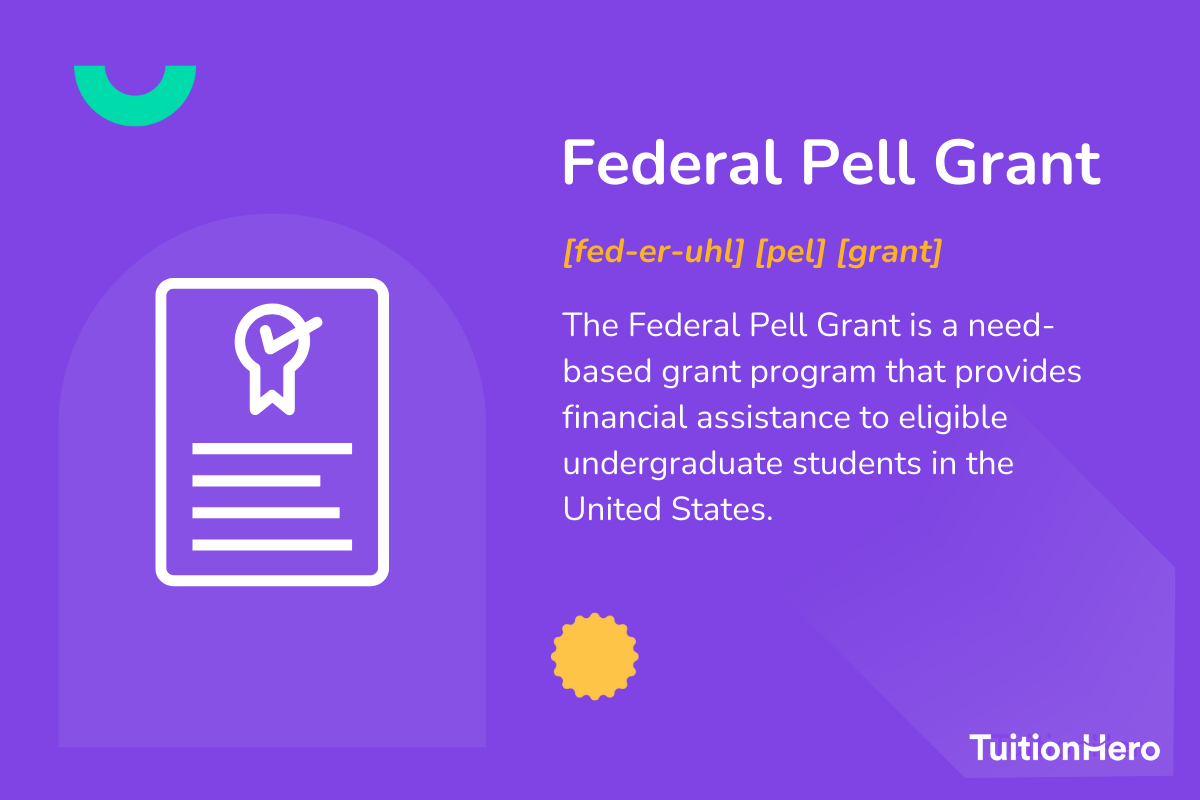Advertiser Disclosure
Last update: November 16, 2024
5 minutes read
What Is a Federal Pell Grant?
Need help covering college costs? Learn how a Federal Pell Grant can support your education dreams, whether you are eligible, and tips when applying.

By Brian Flaherty, B.A. Economics
Edited by Rachel Lauren, B.A. in Business and Political Economy
Learn more about our editorial standards



By Brian Flaherty, B.A. Economics
Edited by Rachel Lauren, B.A. in Business and Political Economy
Learn more about our editorial standards
Federal Pell Grants help a lot of students fund their education, but it's crucial to know the differences between Pell Grants and student loans. Let's get into what Pell Grants are and how you can get one for your education. We'll also talk about the Free Application for Federal Student Aid (FAFSA), and give you important tips for filling out the form.

Key takeaways
- Pell Grants don't need to be repaid, making them a valuable resource for students with financial need
- Eligibility for a Pell Grant is based on financial need, as determined by your Expected Family Contribution (EFC) or Student Aid Index (SAI)
- To keep your Pell Grant, you need to keep up satisfactory academic progress and understand the Lifetime Eligibility Used (LEU)
What is a Federal Pell Grant?
A Pell Grant is a type of need-based aid for college students; it's money that you don't have to pay back. This financial aid is for students who demonstrate a big financial need, helping cover many education costs.
Pell grants are different from student loans in that they’re essentially free money awarded based on the applicant's financial situation. To determine eligibility for a Pell Grant, applicants must fill out the Free Application for Federal Student Aid (FAFSA) annually.

This application assesses the student’s and the family's financial information to calculate the Expected Family Contribution (EFC). Soon, the EFC will be replaced by a new metric called the Student Aid Index (SAI), but you’ll still need to complete the FAFSA.
The EFC or SAI, along with the Cost of Attendance (COA) at the chosen institution, helps financial aid officers decide the grant amount a student should get, if any. The Pell Grant program is all about helping people who need money for education.
Let's look at the key factors that determine your eligibility:
- Expected Family Contribution (EFC) or Student Aid Index (SAI): This number comes from the FAFSA and gives an idea of how much money a family can contribute to their child’s college education.
- Cost of Attendance (COA): The school's estimate of total cost, which covers tuition, fees, room, board, and other costs related to education.
Students might also explore options like subsidized and unsubsidized loans, or work-study programs to bridge the gap between their EFC and COA. For more help managing the money you need for school, consider exploring student loan options available to you.
How to apply for a Federal Pell Grant
To get a Federal Pell Grant, you need to fill out the FAFSA form. This form helps figure out if you qualify for different kinds of federal help for students.
Filling out the FAFSA
To start, students and families need to complete the FAFSA online. The form will ask you for details like income, assets, and other relevant information, like the number of family members attending college at the same time.
Schools use this information to create a financial aid package that may include Pell Grants, based on the calculated Expected Family Contribution (EFC)/ Student Aid Index (SAI) and the school's Cost of Attendance (COA). You need to complete the FAFSA every year to stay qualified for a Pell Grant.
Pell Grant eligibility
Pell grants are mainly for undergraduate students who show exceptional financial need. However, some post-baccalaureate programs, specifically those aimed at teacher certification or licensure, may also qualify.
Your eligibility depends on the financial details submitted through the FAFSA. Generally, low-income students who might not otherwise be able to afford college are eligible for Pell Grants.

TuitionHero Tip
It's also important to note that your academic progress can affect your eligibility for Pell Grants.
Keeping your Pell Grant
To keep getting Pell Grant money, you have to do more than just qualify at the beginning. You need to meet specific requirements to keep getting financial help while you're in school.
Fulfilling academic requirements
Colleges set academic standards rules in order to continue qualifying for the Pell Grant. They might say you need to keep a certain GPA and finish a certain number of classes every term.
The term for fulfilling your academic requirements is known as satisfactory academic progress (SAP). As long as you’re making progress towards your degree and passing your classes, you will likely remain Pell Grant eligible. If you don't meet these rules, you may lose your Pell Grant, but usually, you can get it back if you improve your grades.
Lifetime Eligibility Used (LEU)
The LEU keeps track of how much Pell Grant money a student has used during their time in school. There's a limit of six scheduled awards, which is equivalent to six years of being a full-time student. It's crucial to keep an eye on your LEU because it determines how much grant money you can still get in the future.
For a deeper dive into understanding how your financial aid package is put together, including LEU, explore this guide on managing and refinancing your student loans.
Compare private student loans now
TuitionHero simplifies your student loan decision, with multiple top loans side-by-side.
Compare Rates
Dos and don'ts of applying for a Federal Pell Grant
Applying for a Federal Pell Grant is an important step in securing financial aid for college. It's a process that needs attention to detail, timeliness, and honesty. Here are some do’s and don’ts to guide you smoothly through the application process.
Do
Do complete the FAFSA accurately and honestly.
Do check your eligibility for a Pell Grant.
Do review your Student Aid Report (SAR) carefully.
Do monitor your Lifetime Eligibility Used (LEU).
Don't
Don't procrastinate. Submit the FAFSA early.
Don't overlook other financial aid options.
Don't ignore requests for more documentation from your school's financial aid office.
Don't assume you're ineligible without applying.

Why trust TuitionHero
At TuitionHero, we simplify college finances for students and parents. Our experts guide you on Pell Grants, private loans, refinancing, and scholarships. We assist with FAFSA and connect you with student-friendly credit cards. Let us help you maximize your financial resources and get the most out of Federal Pell Grants.
Frequently asked questions (FAQ)
Once you send in your Free Application for Federal Student Aid (FAFSA), you should get a Student Aid Report (SAR) within three days to three weeks. The time it takes depends on if you gave them an email and if you filled out the FAFSA online - it will be processed quicker through the online form.
The SAR won't tell you exactly how much Pell Grant money you'll get, but it will show your Expected Family Contribution (EFC). Later on, your college's financial aid office will tell you if you qualify for a Pell Grant and how much you can expect to get. This usually happens a few weeks after you get accepted.
Yes, Pell Grants can cover educational expenses beyond just tuition. This includes room and board, fees, books, supplies, and even personal expenses related to your education.
The goal of the Pell Grant and other forms of financial aid is to support the overall cost of attending college, making higher education more accessible for students with financial need. For more details on managing your education financing beyond Pell Grants, including credit options tailored to students, explore our student-friendly credit card offers.
If your financial situation changes a lot after you get a Pell Grant, you can tell your financial aid office by filling out a new FAFSA form. Big changes can affect how much money you can get.
For example, if your family's financial situation gets worse, you might be able to get more aid. But if things get better, you might get less money. It's really important to keep your information updated so you can get the right amount of aid.
Final thoughts
Understanding and getting Federal Pell Grants for college is really important if you want to make paying for higher education easier. At TuitionHero, we're here to help you figure out, apply for, and keep getting these grants.
Just remember, education is like an investment in your future, and with the right approach, money doesn't have to stop you from reaching your goals. We're here for you from the start of the application process, all the way to graduation day.
Source
Author

Brian Flaherty
Brian is a graduate of the University of Virginia where he earned a B.A. in Economics. After graduation, Brian spent four years working at a wealth management firm advising high-net-worth investors and institutions. During his time there, he passed the rigorous Series 65 exam and rose to a high-level strategy position.
Editor

Rachel Lauren
Rachel Lauren is the co-founder and COO of Debbie, a tech startup that offers an app to help people pay off their credit card debt for good through rewards and behavioral psychology. She was previously a venture capital investor at BDMI, as well as an equity research analyst at Credit Suisse.
At TuitionHero, we're not just passionate about our work - we take immense pride in it. Our dedicated team of writers diligently follows strict editorial standards, ensuring that every piece of content we publish is accurate, current, and highly valuable. We don't just strive for quality; we aim for excellence.
Related posts
While you're at it, here are some other college finance-related blog posts you might be interested in.
Shop and compare student financing options - 100% free!

Always free, always fast
TuitionHero is 100% free to use. Here, you can instantly view and compare multiple top lenders side-by-side.

Won’t affect credit score
Don’t worry – checking your rates with TuitionHero never impacts your credit score!

Safe and secure
We take your information's security seriously. We apply industry best practices to ensure your data is safe.
Finished scrolling? Start saving & find your private student loan rate today
Compare Personalized Rates




